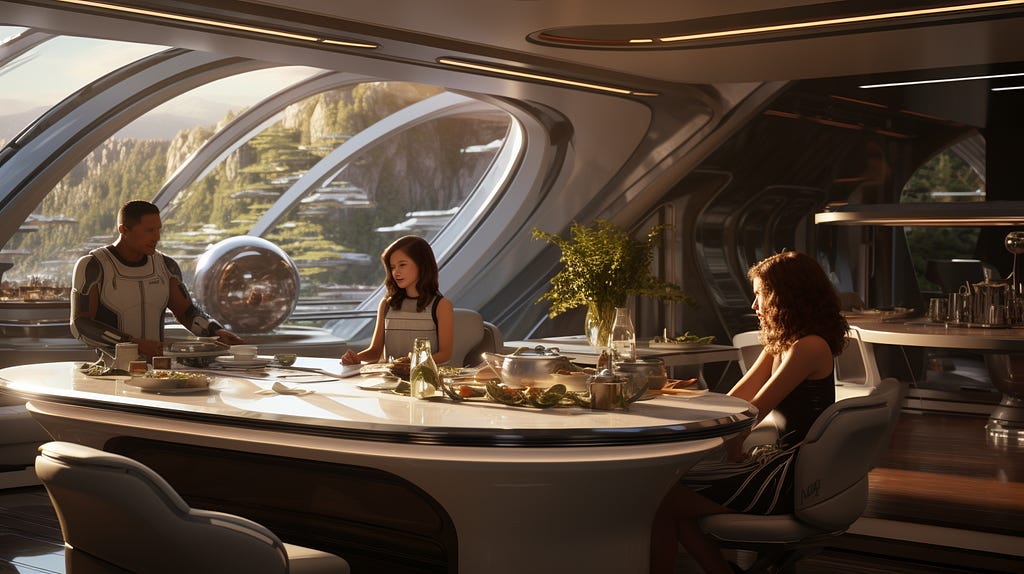The Modern Dilemma: Overwhelmed, Angry, Lonely
If you talk with almost anyone, there’s a sense that people are overwhelmed, angry and lonely. There’s likely many reasons for this, but there’s ample evidence to suggest that technology is partly to blame: it has accelerated our lives, amplified extreme rhetoric through social media, and reduced personal interactions. As someone that has dedicated his life to improving people’s lives through technology, this raises a lot of questions.
The Evolution of “Progress”
For most of human history, progress has been equated to technological advancement: clean water, fast transportation, and medical breakthroughs would all clearly lead to a better future. Walt Disney’s Carousel of Progress is a testament to this traditional narrative. A necessary reminder to some that are glad to reap the rewards of it and yet eager to undermine the efforts to sustain it.
<a href="https://medium.com/media/bb43f532fcb4c8b33566630fe3b5802e/href">https://medium.com/media/bb43f532fcb4c8b33566630fe3b5802e/href</a>
However, we’re now at a crossroads where dreams of progress have been actualized, and we stand on the brink of a post-scarcity economy. This new era, where automation could potentially make monetary systems less relevant, raises profound questions about our future. Until 2010, it was hard to argue technology wasn’t creating the progress we wanted to see. But is what we’re living now a preview of what’s to come? Recent manifestos from tech leaders like Andreessen Horowitz and Vitalik Buterin offer visions of this future, but often overlook a crucial aspect: the current state of social affairs. How do we shape a digital future that fosters self-discovery, personal purpose, and human connection?
Personal Journey: A Digital Obstacle Course
It’s May 2020. I’m seated in my recliner, reflecting not on the upheavals of COVID, but on a realization dawning upon me at that moment — a potentially transformative idea.
For the previous year, I had embarked on a journey to intricately map the various facets of my life. You see, I wanted to take a deep dive into all the different dimensions of myself — from my personality to preventative health and even skills learning. I wanted to create a more intentional and methodical process of self discovery and personal growth. There’s entire communities dedicated to solving this under the banner of Personal Knowledge Management, Second Brain and the Quantified Self Movement.
But the process was fraught with challenges and complexities. It required searching for specialized websites in google, joining communities in reddit, looking up reviews for sequencing services, storing my information from test results in google drive, downloading and paying for tracking apps, creating templates in Notion, and so on. You get the picture. Digital engagement with all my interests and aspects was fragmented across multiple specialized apps, leading to distractions, disengagement, and a complex web of platforms and costs. In short, pursuing my interest turned into a digital obstacle course.
So I started to wonder: could there be a simpler, less cluttered digital approach to something as vital as ‘preventative health’? Or any other life area for that matter? Could such a streamlined experience even be possible?
Reconnecting with ourselves
As the months went by, I found myself abandoning many manual tracking methods. They were tedious, and the insights were not as valuable as I’d hoped. But then, on that auspicious day in May, a compilation of thoughts across the previous months coalesced into a single “aha!” moment. What if we could turn our interests into adventures? Like an RPG game, with endless personalization and quests, where the journey led to personal discovery, companionship and growth?
Role Playing Games (RPGs) are a fascinating topic. They are masters at character creation and development. Any decision you make and every conversation you have changes the game’s outcome. You get to pick your companions, your clothing, you get to develop and master skills; you get the idea. You level up. You get to shape your character and world.
Problem was, unlike a game, there didn’t exist any tool in real life that could create a focused environment where I could pursue any interest as an adventure. I wanted immersion, but what’s more, I wanted the feeling I got when playing a game. I wanted to feel the excitement of leveling up along with my other companions that were sharing in the adventure. Given the importance of our interests, I wondered: why can’t we engage with all the different areas of my life in a way that’s both captivating and empowering?
In an age where we have more knowledge and tools than ever, why are so many people feeling demotivated and disconnected from themselves, their interests and other people? Sure, the pace and stress of modern day life has a lot to do with it. But could there be more to this story? I believe so. I believe that as we’ve turned to the digital realm to engage with most of our interests, the fragmented experience has resulted in a systematic erosion of our identity. Every time I digitally engage with an interest, there’s an ad, post, or influencer nagging me for attention; diverting me away from my soul’s calling. When I engage in social media I’m often besieged by trolls and aggressive users that remove joy instead of creating belonging and companionship. What started as a desire to engage with an interest became the opposite. What started as a deep dive into cultivating my individuality turned into engaging with content that others wanted me to engage with. Do this enough times a day, for enough years, and you will begin to forget what the interests that align with your true identity actually are. You’ll begin to drift in a fog of digital noise until you forget what makes you special. What makes you unique.
The Vision: A Human-Centric Digital Future
As I sat in my beloved recliner, an idea crystallized. What I was searching for was a feeling, not just the understanding of myself. Sure, I wanted to feel in control of my life. In some ways, in many ways, I knew I was not just forsaking important dimensions of myself, but was also in search of clarity. Because without clarity, I cannot have motivation. And without motivation and a purpose, I can drift through life and land anywhere — most likely not where I would have liked. Motivation is as much about understanding myself and my interests as it is about visualizing a way forward. The future I wish to step into. And it’s that charted path towards the future that creates that inevitable feeling of excitement.
The tool I wished for had to replicate what those RPG games had made me feel. It reminded me of my favorite ad ever: Designed by Apple in California. “The first thing we ask is: what do we want people to feel?”. I knew right then: this place where I could evoke this feeling, create this clarity, this absolute sense of ownership over my real self — it needed to exist.
<a href="https://medium.com/media/0f94989133d0e1765562d39f0d0249cf/href">https://medium.com/media/0f94989133d0e1765562d39f0d0249cf/href</a>
All my life I had been nurturing the expertise needed to build something like this. From my ECE speciality in neural engineering, to co-founding a skills marketplace, to being a smart city CIO, to co-founding a bioinformatics startup; understanding and empowering people’s lives had always been my goal. At that moment, I knew I had to create it. What could be more important than our self discovery and personal growth?
A digital guide that fosters personal growth
Even if technology automates us out of our jobs, this personal guide could illuminate an internal, effort-driven purpose that can remain meaningful even when a robot can perform that mission more effectively. Of equal importance, it helps us embark on these personal growth quests with other like-minded individuals with a shared mission of personal growth. We revere and value Olympians and sports teams not because they are unbeatable, but because we recognize and admire the dedication required to refine their skills. This admiration persists, unaffected by whether a robot can outrun a sprinter or outplay a soccer team. In the end, effort is by definition a scarce resource; and the source of our personal growth.
As this series progresses, I will explore the modules of a reimagined personal development ecosystem, illustrating how a unified approach can lead to more meaningful and purposeful interactions in a technologically advanced age. Join me on this journey as we navigate towards a future where technology enhances, rather than diminishes, our human experience.








